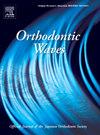Computerized occlusal analysis of two different removable retainers used during retention phase- A Randomized controlled trial
IF 0.5
Q4 DENTISTRY, ORAL SURGERY & MEDICINE
引用次数: 1
Abstract
ABSTRACT Aim: To evaluate and compare occlusal contact force distribution, occlusion time and disclusion time following wear of Begg’s wrap around retainer and Vacuum formed retainer after completion of orthodontic treatment using a T-scan III. Materials and Methods: Twenty subjects after completion of active orthodontic treatment were randomly allocated into two groups, Group I – Begg’s wrap-around retainer (n-10) and Group II–vacuum formed retainer (n-10) one patient was lost to follow up in each group and the final sample size assessed at T1 in each group was 9. T-scan III was used at two-time intervals, T0 – first scan taken immediately after debonding and T1 – taken during retention any time between 10 and 12 months. Comparison of parameters within the groups was done using paired t-test and comparison between the groups was done using independent t-test. Results: No statistically significant difference in the distribution of occlusal contact forces was noted in both groups at T0 and T1 (p value<0.05). Disclusion time reduced in both groups at T1 but a statistically significant reduction in the disclusion time of left lateral excursive movement and protrusive movements (p value<0.05) was noted (T0-T1) in Group I. Statistically significant increase in the occlusion time was noted in Group II (T0-T1) at T1 between the two groups. Conclusion: No differences in occlusal contact force distribution was noted within and between the two groups. Disclusion time reduced in subjects on Begg’s wrap around retainers indicating favourable muscle activity and Occlusion time increased in subjects on vacuum formed retainers.在固位阶段使用的两种不同的可移动固位器的计算机咬合分析-一项随机对照试验
目的:应用T-scan III评价和比较正畸治疗完成后贝格氏包裹固位器和真空成形固位器佩戴后的咬合接触力分布、咬合时间和离断时间。材料与方法:20例患者在完成积极正畸治疗后,随机分为两组,第一组-贝格氏缠绕固位器(n-10)和第二组-真空成形固位器(n-10),每组少随访1例,每组T1时最终样本量为9例。t -扫描III每隔两个时间间隔使用,T0 -在剥离后立即进行第一次扫描,T1 -在保留期间进行10至12个月的任何时间。组内参数比较采用配对t检验,组间比较采用独立t检验。结果:T0、T1时两组牙合接触力分布差异无统计学意义(p值<0.05)。两组在T1时的咬合时间均有所减少,但ⅰ组在T1时左侧游离运动和前突运动的咬合时间减少有统计学意义(p值<0.05)(T0-T1),ⅱ组在T1时咬合时间增加有统计学意义(T0-T1)。结论:两组间牙合接触力分布无明显差异。使用贝格氏固定器的受试者解除时间缩短,表明有利于肌肉活动,而使用真空成形固定器的受试者解除时间增加。
本文章由计算机程序翻译,如有差异,请以英文原文为准。
求助全文
约1分钟内获得全文
求助全文
来源期刊

Orthodontic Waves
DENTISTRY, ORAL SURGERY & MEDICINE-
CiteScore
0.40
自引率
0.00%
发文量
0
期刊介绍:
Orthodontic Waves is the official publication of the Japanese Orthodontic Society. The aim of this journal is to foster the advancement of orthodontic research and practice. The journal seeks to publish original articles (i) definitive reports of wide interest to the orthodontic community, (ii) Case Reports and (iii) Short Communications. Research papers stand on the scientific basis of orthodontics. Clinical topics covered include all techniques and approaches to treatment planning. All submissions are subject to peer review.
 求助内容:
求助内容: 应助结果提醒方式:
应助结果提醒方式:


